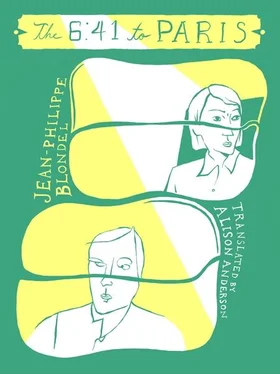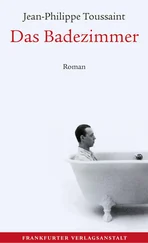The Peugeot 204 was my revenge for Mathieu’s motorcycle. As I thought, I saw less of Mathieu after he came back from Germany. And when we got together he would always say how lucky I was to have a car. He had become a regular on the train, the RER, and the Métro; he kept going up to Paris to try his luck. He was having a hard time. Sleeping on friends’ sofas, on mattresses on the floor, sometimes right on the floor. Sleeping out on the street, too, on those occasions when he didn’t manage to sponge off someone. He was losing his cheerful nature. I’m not really sure when things began to change for him. At one point, he almost disappeared from sight, but then when he reappeared he had landed himself a supporting role in a TV movie. But he refused to talk about it. Then another long spell of silence. He had plunged into another world. I missed him. Even though I was struggling with my own demons, and the desire to make my own way in life, I missed him. I could have asked his parents for news. I was too proud. When I got my first real contract, at the superstore where I still work, he was the one I wanted to call before anyone else. But to tell him what? To brag about how now I was qualified to sell TVs and VCRs? I didn’t want to hear myself telling him that. Even though I knew that this job was a lifesaver, since I’d given up studying English, and gone back to the town where I was born, and spent months looking for work; even after all the broken promises. No. I figured I’d call him when I found something else.
After that, I worked on other friendships. There were colleagues. Christine. Christine’s friends. That was it. Sometimes just as I was falling asleep I would think about Mathieu. I wondered what he was doing. I’d had news of him indirectly. I watched the TV movies he played in. And the feature films, where his tall, slender physique was becoming more and more visible. That was what surprised me more than anything: I had always thought of Mathieu as plump. The guy whose screen career I was vaguely following didn’t look anything like him. Even his voice seemed to have changed. It was deeper.
Whenever I came out of the movie theater, I felt like calling him — and I never got up the resolve.
The only consolation in all those years was my family. Christine. The girls. I waited anxiously for the day when Mathieu’s photo would appear in some celebrity magazine with a gorgeous Spanish actress or Ukrainian supermodel on his arm, and the cryptic caption underneath: “Could that little bulge at the waist be the sign of an future joyful event?”
It never happened.
First of all because his love affairs never lasted very long. But above all because he never became famous. For a long time he was a familiar face, but in the background. His career would have been completely lackluster had it not been for Today’s Lucky Winners. Today’s Lucky Winners was really a stroke of luck for him. He was well acquainted with the producer of the program, who was looking for an experienced host not too well-known to the general public. They did some screen tests. Bingo. There he was in one of the most popular programs on French television: a pathetic game show, perfect for filling the lonely hours of the unemployed or housewives under fifty, while they wait for the one o’clock news. His sense of humor, his handsome face, his easy way with people: in a few weeks, he walked off with the jackpot. Money was no longer a problem. It was 2004; he was forty years old. His future was all sewn up.
It was around then that Christine and I got divorced. It was also around then that I stopped buying the TV Guide. I couldn’t stand seeing pictures of Mathieu anymore. I was only too aware of how our paths in life were heading in different directions. We had met at a time when he was merely a rough draft of the person he would later become, while I was at my zenith. He would keep on rising, whereas I had begun to sink gradually. Every time I caught his face in a magazine, those were my thoughts. About failure. About destiny slipping out of your grasp.
I’m better now.
And I’m on my way to visit Mathieu today.
Gulp.
I’m not proud of myself.
And I know why.
He’s the one who got back in touch. I would never have dared. Not because I would have been afraid of disturbing him. But because I was afraid of being humiliated: What if he could hardly remember my name?
I ran into his mother, just after my divorce. She was shopping at the store. She wanted to buy a new television. She had just lost her husband — I hadn’t heard about it. We spoke for a long time. She invited me over for the following Sunday, a Sunday when I didn’t have the kids. She’d bake a cake. When I left the store that evening, I felt like crying — as much over her solitude as over the way my life was going. I was going to be filling in for my erstwhile best friend. He had dreamed of being in my place; now I was taking his. I was stepping into the shoes of the man he might have been, the lonely man who visits his mother for Sunday tea.
One day, Mathieu found out. I thought it would make him angry. It was worse than that. He felt pity. And it’s true, basically, that pity was all I deserved — a fortysomething guy taking refuge at the home of his childhood friend’s mother, talking about life, how lame can you get. But I liked going to Maud’s place. Peeling vegetables with her. Doing the sort of daily activities I had never done with my parents. What I liked was that Maud wasn’t judgmental. Even less so nowadays that she’s been diagnosed with Alzheimer’s. I look back on those days and really miss them, almost more than any other time in my life. My dinners at Maud’s. My Sundays spent preparing tasty dishes while exchanging thoughts about life, neighbors, children. I miss her.
Mathieu and I started calling each other because of her. I had just found her in the parking lot of the store, distraught and completely disoriented. I called the doctor. Then her son. I remember Mathieu’s voice on the telephone. And the voice he had as an adolescent. Nothing remotely like the grave, confident timbre he’d created for his TV movies. Nor like the exaggeratedly cheerful self he’d adopted for Today’s Lucky Winners. Truth be told, he wasn’t very lucky that day. He had to rely on me. To ask me a favor. Maybe the first of many. He was beholden to me.
That’s how we became friends once again.
Friends.
That’s saying a lot.
Let’s just say that it was saying a lot until recently. We would call each other. He would stop by from time to time. We only talked about his mother and his career. One day he did ask me, however, if it hadn’t been too rough on me, the divorce. In fact, I’d been through it already long before, so I was able to smile and shrug and say, “That’s life.” I don’t know why, but it must have touched him, so he invited me to his place. In Paris. To his apartment. To a party with his Parisian friends.
It was an honor.
There I was in that milieu where I didn’t belong, among people who drank too much and laughed very loudly, among tired-but-bubbly wives, and catering staff who walked around with finger food and refills. Mathieu simply introduced me as, “Philippe, a childhood friend.” They all stared at me with a big smile for ten seconds or so and then the conversation would continue, without me. I melted into the décor. It wasn’t hard. I felt like I was in a bad TV movie. I recognized a few faces I’d spotted on the TV screen, but I couldn’t put a name on any of them. The big shots had promised they’d come but at the last minute they called to cancel. Or didn’t call. And Mathieu really didn’t mind at all. What was radiant about Mathieu’s place was Mathieu himself.
Also radiant that evening was a woman twenty years younger than him, lively and witty. Who worked as an usher at a theater to pay for law school. Totally on top of things. Her name was Astrid. Even at the very heart of the party she was true to herself. She would drift toward Mathieu and then away again, perfectly natural and nonchalant. I envied her. I envied Mathieu, too, of course. They’d been seeing each other for a few months, but she had no illusions. Sooner or later their affair would end, she would get tired of playing the gerontophile or he would find a woman who was more docile.
Читать дальше












